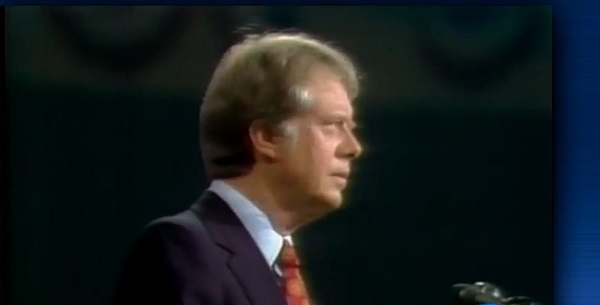Daily Caller
Former President Jimmy Carter Dies At Age 100

Then Gov. Jimmy Carter addresses the 1976 Democratic National Convention at Madison Square Garden in New York City. (Screen Capture/CSPAN)

From the Daily Caller News Foundation
By Ryan Meilstrup
Former President Jimmy Carter died on Sunday at age 100 after over a year in hospice care in Plains, Georgia, his son announced according to multiple outlets.
Prior to his passing, Carter was subjected to several brief hospital visits over the past few years and chose to forgo additional medical attention in February 2023.
The former president had previously suffered from several health complications, including cancer, various falls and a brain bleed. Jason Carter told CNN on May 14 that his grandfather’s time was “coming to the end,” and another grandson, Josh, told People in mid-August 2023 that “we’re in the final chapter.”
The Carter Center also announced in May 2023 that Rosalynn Carter, a staunch advocate of mental health, was diagnosed with dementia, and later entered into hospice care in mid-November. The 96-year-old former first lady passed away days later at their home in Georgia.
Carter was the 39th president of the U.S., was elected in 1976 and served the country for one term until 1981. He also served as Georgia’s 76th governor from 1971 to 1975 as a member of the Democratic Party.
The Carter administration’s accomplishments included the Panama Canal treaties, the improving of U.S. relations with China, as well as programs and initiatives under the new Departments of Energy and Education. He established The Carter Center after his presidency, a humanitarian nongovernmental organization.
Carter’s presidency faced several major challenges, like the Iran hostage crisis, decreased energy production and inflation, according to Reuters. He lost overwhelmingly lost his reelection bid to Ronald Reagan in 1980.
Following his presidency, Carter was involved in numerous philanthropic and public service efforts. He engaged in “conflict mediation” in numerous countries worldwide and led efforts to eradicate Guinea worm disease, according to The Carter Center. Carter and his wife volunteered annually for Habitat for Humanity, and Carter taught Sunday School at Maranatha Baptist Church of Plains.
In 2002, Carter received the Nobel Peace Prize “for his decades of untiring effort to find peaceful solutions to international conflicts, to advance democracy and human rights, and to promote economic and social development.”
Carter was the longest living president in history, and he and his wife held the record for the longest first-couple marriage. He was born in Plains, Georgia, on Oct. 1, 1924, attended Georgia Tech and served in the U.S. Navy as a submariner.
Mary Lou Masters contributed to this report
Business
Scott Bessent Says Trump’s Goal Was Always To Get Trading Partners To Table After Major Pause Announcement


From the Daily Caller News Foundation
By
Secretary of the Treasury Scott Bessent told reporters Wednesday that President Donald Trump’s goal was to have major trading partners agree to negotiate after Trump announced a 90-day pause on reciprocal tariffs for many countries after dozens reached out to the administration.
Trump announced the pause via a Wednesday post on Truth Social that also announced substantial increases in tariffs on Chinese exports to the United States, saying 75 countries had asked to talk. Bessent said during a press event held alongside White House press secretary Karoline Leavitt that Trump had obtained “maximum leverage” to get trading partners to negotiate with the April 2 announcement of reciprocal tariffs.
“This was his strategy all along,” Bessent told reporters during an impromptu press conference at the White House. “And that, you know, you might even say that he goaded China into a bad position. They, they responded. They have shown themselves to the world to be the bad actors. And, and we are willing to cooperate with our allies and with our trading partners who did not retaliate. It wasn’t a hard message: Don’t retaliate, things will turn out well.”
Dear Readers:
As a nonprofit, we are dependent on the generosity of our readers.
Please consider making a small donation of any amount here.
Thank you!
WATCH:
China imposed retaliatory tariffs on American exports to the communist country Wednesday, imposing an 84% tariff on U.S. goods after Trump responded to a 34% tariff by taking American tariffs to 104%.
“Based on the lack of respect that China has shown to the World’s Markets, I am hereby raising the Tariff charged to China by the United States of America to 125%, effective immediately,” Trump said. “At some point, hopefully in the near future, China will realize that the days of ripping off the U.S.A., and other Countries, is no longer sustainable or acceptable.”
“They kept escalating and escalating, and now they have 125% tariffs that will be effective immediately,” Bessent said during the press conference.
Bessent said that China’s actions would not harm the United States as much as it would their own economy.
“We will see what China does,” Bessent said. “But what I am certain of, what I’m certain of, is that what China is doing will affect their economy much more than it will ours, because they have an export-driven, flood the world with cheap export model, and the rest of the world now understands.”
The Dow Jones Industrial average closed up 2,962.86 points Wednesday, with the NASDAQ climbing by 1,755.84 points and the S&P 500 rising 446.05 points, according to FoxBusiness.
Banks
Wall Street Clings To Green Coercion As Trump Unleashes American Energy


From the Daily Caller News Foundation
By Jason Isaac
The Trump administration’s recent move to revoke Biden-era restrictions on energy development in Alaska’s North Slope—especially in the Arctic National Wildlife Refuge (ANWR)—is a long-overdue correction that prioritizes American prosperity and energy security. This regulatory reset rightly acknowledges what Alaska’s Native communities have long known: responsible energy development offers a path to economic empowerment and self-determination.
But while Washington’s red tape may be unraveling, a more insidious blockade remains firmly in place: Wall Street.
Despite the Trump administration’s restoration of rational permitting processes, major banks and insurance companies continue to collude in starving projects of the capital and risk management services they need. The left’s “debanking” strategy—originally a tactic to pressure gun makers and disfavored industries—is now being weaponized against American energy companies operating in ANWR and similar regions.
Dear Readers:
As a nonprofit, we are dependent on the generosity of our readers.
Please consider making a small donation of any amount here. Thank you!
This quiet embargo began years ago, when JPMorgan Chase, America’s largest bank, declared in 2020 that it would no longer fund oil and gas development in the Arctic, including ANWR. Others quickly followed: Goldman Sachs, Wells Fargo, and Citigroup now all reject Arctic energy projects—effectively shutting down access to capital for an entire region.
Insurers have joined the pile-on. Swiss Re, AIG, and AXIS Capital all publicly stated they would no longer insure drilling in ANWR. In 2023, Chubb became the first U.S.-based insurer to formalize its Arctic ban.
These policies are not merely misguided—they are dangerous. They hand America’s energy future over to OPEC, China, and hostile regimes. They reduce competition, drive up prices, and kneecap the very domestic production that once made the U.S. energy independent.
This isn’t just a theoretical concern. I’ve experienced this discrimination firsthand.
In February 2025, The Hartford notified the American Energy Institute—an educational nonprofit I lead—that it would not renew our insurance policy. The reason? Not risk. Not claims. Not underwriting. The Hartford cited our Facebook page.
“The reason for nonrenewal is we have learned from your Facebook page that your operations include Trade association involved in promoting social/political causes related to energy production. This is not an acceptable exposure under The Hartford’s Small Commercial business segment’s guidelines.”
That’s a direct quote from their nonrenewal notice.
Let’s be clear: The Hartford didn’t drop us for anything we did—they dropped us for what we believe. Our unacceptable “exposure” is telling the truth about the importance of affordable and reliable energy to modern life, and standing up to ESG orthodoxy. We are being punished not for risk, but for advocacy.
This is financial discrimination, pure and simple. What we’re seeing is the private-sector enforcement of political ideology through the strategic denial of access to financial services. It’s ESG—Environmental, Social, and Governance—gone full Orwell.
Banks, insurers, and asset managers may claim these decisions are about “climate risk,” but they rarely apply the same scrutiny to regimes like Venezuela or China, where environmental and human rights abuses are rampant. The issue is not risk. The issue is control.
By shutting out projects in ANWR, Wall Street ensures that even if federal regulators step back, their ESG-aligned agenda still moves forward—through corporate pressure, shareholder resolutions, and selective financial access. This is how ideology replaces democracy.
While the Trump administration deserves praise for removing federal barriers, the fight for energy freedom continues. Policymakers must hold financial institutions accountable for ideological discrimination and protect access to banking and insurance services for all lawful businesses.
Texas has already taken steps by divesting from anti-energy financial firms. Other states should follow, enforcing anti-discrimination laws and leveraging state contracts to ensure fair treatment.
But public pressure matters too. Americans need to know what’s happening behind the curtain of ESG. The green financial complex is not just virtue-signaling—it’s a form of economic coercion designed to override public policy and undermine U.S. sovereignty.
The regulatory shackles may be coming off, but the private-sector blockade remains. As long as banks and insurers collude to deny access to capital and risk protection for projects in ANWR and beyond, America’s energy independence will remain under threat.
We need to call out this hypocrisy. We need to expose it. And we need to fight it—before we lose not just our energy freedom, but our economic prosperity.
The Honorable Jason Isaac is the Founder and CEO of the American Energy Institute. He previously served four terms in the Texas House of Representatives.
-

 Also Interesting1 day ago
Also Interesting1 day agoMortgage Mayhem: How Rising Interest Rates Are Squeezing Alberta Homeowners
-

 2025 Federal Election1 day ago
2025 Federal Election1 day agoConservative Party urges investigation into Carney plan to spend $1 billion on heat pumps
-

 Alberta2 days ago
Alberta2 days agoAlberta’s embrace of activity-based funding is great news for patients
-

 2025 Federal Election1 day ago
2025 Federal Election1 day agoCommunist China helped boost Mark Carney’s image on social media, election watchdog reports
-

 COVID-192 days ago
COVID-192 days agoMassive new study links COVID jabs to higher risk of myocarditis, stroke, artery disease
-

 Also Interesting2 days ago
Also Interesting2 days agoExploring Wildrobin Technological Advancements in Live Dealer Games
-

 2025 Federal Election1 day ago
2025 Federal Election1 day agoCorporate Media Isn’t Reporting on Foreign Interference—It’s Covering for It
-

 2025 Federal Election1 day ago
2025 Federal Election1 day agoFifty Shades of Mark Carney




